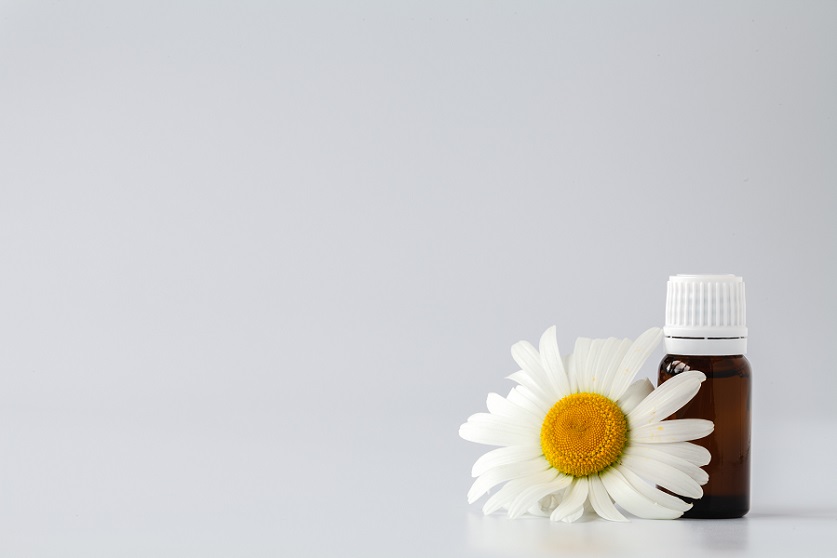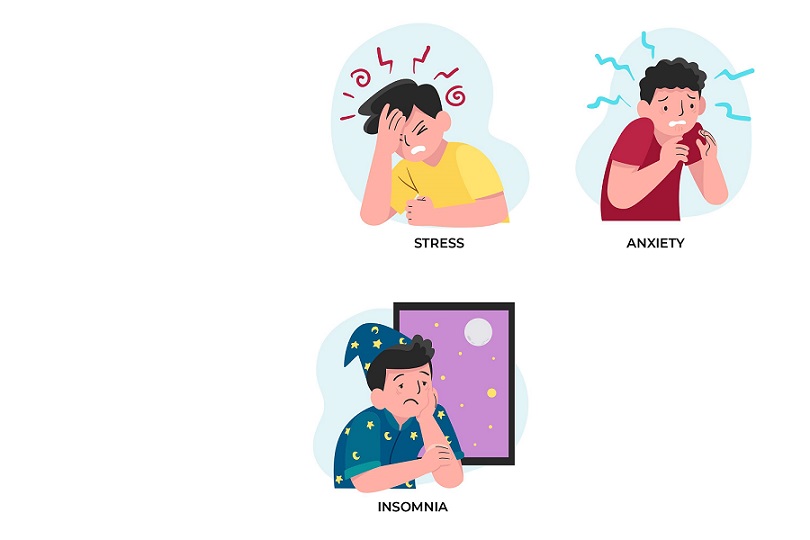Chamomile Essential Oil:
Essential oils are mostly derived from concentrated extracts from plants. Over the years, essential oils have migrated more and more into the spotlight. Thus, partly do to more research and studies examining their effectiveness in various applications. Today we’re excited to discuss chamomile essential oil.

Aromatherapy, whether that be by essential oil diffusing, car diffusers, lotions, creams, candles or in message oils, continue to grow in popularity. Like jasmine, chamomile oil has been a part of various studies.
There’s Two Types?
Oftentimes, chamomile is associated with tea drinking. However, it also produces oils that can be used in various other applications. Chamomile oils come from chamomile flowers, similar to daisies. There origin is South & West Europe, as well as North America.
The chamomile plant is available in two different varieties. Firstly, is the Roman Chamomile plant, which is also known as the English Chamomile. Secondly, is the German Chamomile.
Both the Roman and German Chamomile look somewhat similar. However, indeed have differences in their chemical compositions. Thus, alters end product, leading one to perform better in various applications.

Extraction & Other Tidbits:
Chamomile oil extraction, from the chamomile flowers, is carried out by a process called steam distillation. However, can also be extracted by solvent extraction. These two different plants produce different amounts of chamomile extract. Roman Chamomile produces 1.7% of the extract. While German Chamomile, produces 0.2 and 0.4%.
Like many essential oils, the use of this oil dates back to the ancient times. Furthermore, was believed to provide aid in many different settings. Some of the uses over the years include;
- digestive support,
- aiding in symptoms of anxiety,
- helpful for skin conditions such as rashes and eczema, and to
- promote sleep.
Traditional Uses of Chamomile Essential Oils:
Soothe:
Compounds within chamomile have anti-inflammatory, and calming properties, that can soothe your skin. Chamomile oil can be a natural way to improve skin complexion, whether you suffer from irritation or acne.
A study in 2010, linked German Chamomile (GC) as having an ability to alleviate atopic dermatitis through influencing certain cell activation. Keep in mind, this was an animal (mice)-based study!
Chamomile oils are well known for there external applications. For example, toothaches & earaches. It can also be added to baths, sometimes used for soothing ano-genital inflammation.
Heal:
Traditionally, (According to Molecular Medicine Reports, 2012), chamomile essential oils were thought to be responsible for helping to repair skin and minimizing the appearance of blemishes. As a traditional medicine, it is used to treat wounds, ulcers, eczema, gout, skin irritation, and burns.
In tea preparation it can be used as a kind of mouth wash or gentle gargle to alleviate inflammation of the mouth and throat.
Detox:
Chamomile has antioxidant elements. Consequently, it is thought to help flush out toxins and trigger circulation. It may also help your skin and body get rid of these toxins, reducing acne, hyperpigmentation, and blemishes.
Benefits of Chamomile Essential Oil:
The Potential To Promote Digestive Health (diarrhea):

Having proper digestion is extremely important for our health. It can effect us in many ways if not well maintained, or issues arise with GI health.
German Chamomile (GC) extracts have been known to offer protection against diarrhea and fluid buildup in the intestines. Multiple studies have been done. One specific study resulted in an apple pectin-chamomile extract shortening the course of diarrhea in children. It also helped relieve symptoms associated with their condition.
Two other studies in 2007 looked at Chamomile tea (along with other herbs) in children suffering from colic. After 7 days, parents reported tea eliminated colic in 57% of these infants.
It also has muscle-relaxing properties, which helps with digestive conditions like indigestion and cramping. It’s especially helpful in dispelling gas, soothing the stomach and relaxing the muscles that move food through the intestines (2006).
It’s been used after C-sections as an attempt to help sooth the stomach and outgas while helping to improve appetite. This information was based off a 2018 study that looked at this common complication of postoperative bowel activities in these patients. In a randomized control trial, 47 patients had diluted chamomile oil rubbed on their abdomen. The results suggested that there is potential here to have a therapeutic effect on GI motility, and reducing the duration of POI.
Potential To Fights Anxiety:

A more well known benefit of using essential oils, in today’s high paced world, is through aromatherapy applications. Various aroma’s may stimulate the limbic system, a part of the brain that helps control emotions.
In the case of chamomile, in a double-blind randomized, placebo-controlled study published in 2013, end results were that chamomile may have “clinically meaningful antidepressant activity”. This was in addition to anti-anxiety activity chamomile is known already to have.
There have been other studies suggestive of blends of oils with chamomile that have also showed it’s ability to effectively reduce anxiety in certain settings.
Potential To Combat Insomnia/Sleep Aid/Sedation:
Chamomile oils have been used to help improve quality of sleep for many individuals. It has a naturally soothing and calming effect on your body. Potentially, due to the flavonoid, apigenin that binds to benzodiazepine receptors in the brain.
One animal study in 2005, saw that extracts from chamomile had benzodiazepine-like hypnotic activity. However, it seems to remain unclear exactly what compounds are responsible for any such sedative effects.
A research study published in 2006, looked at the effect of the aroma from Roman Chamomile and mood among 80 volunteers. The study revealed a significant effect of condition on overall quality of memory, long term member, and accuracy of attention, as well as alertness and calmness. Overall the volunteers demonstrated a more calm and drowsy state with the Chamomile aroma.
Potential In Pain Relief:

Chamomile oils may have analgesic properties that work effectively to help reduce pain either in muscles or joints. Thus, potentially helping to reduce the need for pain relief medication when applied to the skin and used appropriately.
Anti-inflammatory properties of the compounds within chamomile, and ability to act as a soothing agent, may be contributing to it’s pain relieving properties.
A study in human volunteers 1994, found that chamomile flavonoids have the ability of not just effecting the top layer of skin, but can penetrate below the surface into deeper layers.
A 2016 study looked at topical chamomile application for mild to moderate carpal tunnel syndrome. Results found the group severity score receiving the chamomile oil were significantly improved then the one given the placebo.
Potential As An Antibacterial & To Boost Immune System:
Finally, chamomile is long said to have antioxidant properties as well. These would in essence help to strengthen immunity, and fight certain infections, whether that be the common cold or other infectious processes.
There is some indication (found in this review of literature, 2011) for inhaled Chamomile being able to help fight symptoms of the common cold by steam inhalation. However, limited data exists to further confirm this finding.
How to Use Chamomile Essential Oil:
Like with all essential oils, we only encourage or discuss external use, not ingestion.
Instill 3-5 drops of essential oil to a diffuser of choice, or blend with other oils. This may help improve mood and relieve anxiety symptoms.
If applying externally in a massage-type setting, dilute with a carrier oil, like coconut or jojoba oil. Always test a small area of skin first to make sure no negative reaction occurs.
Furthermore, add this essential oil into a face cream (2-3 drops). If you’re using on acne prone areas, we would suggest using an oil that is lightweight and does not clog pores. We do not suggest using essential oils undiluted on the skin.
Side Effects of Chamomile Essential Oil:
Again, we do not encourage ingestion. We enjoy researching and educating about the ingredients we may use within our soaps, bath bombs, and other skin care products. Thus, giving you an overall history and/or data to support claims made about certain oils and usage.
Be cautious if pregnant and always consult a medical professional before use.
Do not use on young children.
If you’re receiving treatment for any medical condition, do not stop that treatment before consulting a medical professional. Surely, the information on this site is not to provide you with an alternative or supplement your current interventions.
Always test essential oils on a small area of the body. If any negative reaction occurs, stop use immediately and consult with a medical professional.
Final Thoughts!
We hope that you have learned something new about the research behind Chamomile essential oils. Please be sure to share any experiences you’ve had with this oil and in what application you may have used it as well as any other research you may find.
Resources:
- https://www.healthline.com/nutrition/5-benefits-of-chamomile-tea
- https://decleor.com/en/oil-effects/soothing/chamomile.html
- https://www.hollandandbarrett.com/the-health-hub//natural-beauty/aromatherapy/chamomile-oil-uses-and-benefits/
- https://www.ncbi.nlm.nih.gov/pmc/articles/PMC2995283/
- https://accp1.onlinelibrary.wiley.com/doi/abs/10.1002/j.1552-4604.1973.tb00202.x
- https://pedsinreview.aappublications.org/content/28/4/e16
- https://www.sciencedirect.com/science/article/abs/pii/S0944711306000808?via%3Dihub
- https://pubmed.ncbi.nlm.nih.gov/15863883/
- https://pubmed.ncbi.nlm.nih.gov/8073060/
- https://www.ncbi.nlm.nih.gov/pmc/articles/PMC6121760/
- https://pubmed.ncbi.nlm.nih.gov/28107852/
- https://www.ncbi.nlm.nih.gov/pmc/articles/PMC3600408/
- https://doi.org/10.1155/2013/381381
- https://www.sciencedirect.com/science/article/abs/pii/S0962456206000245


